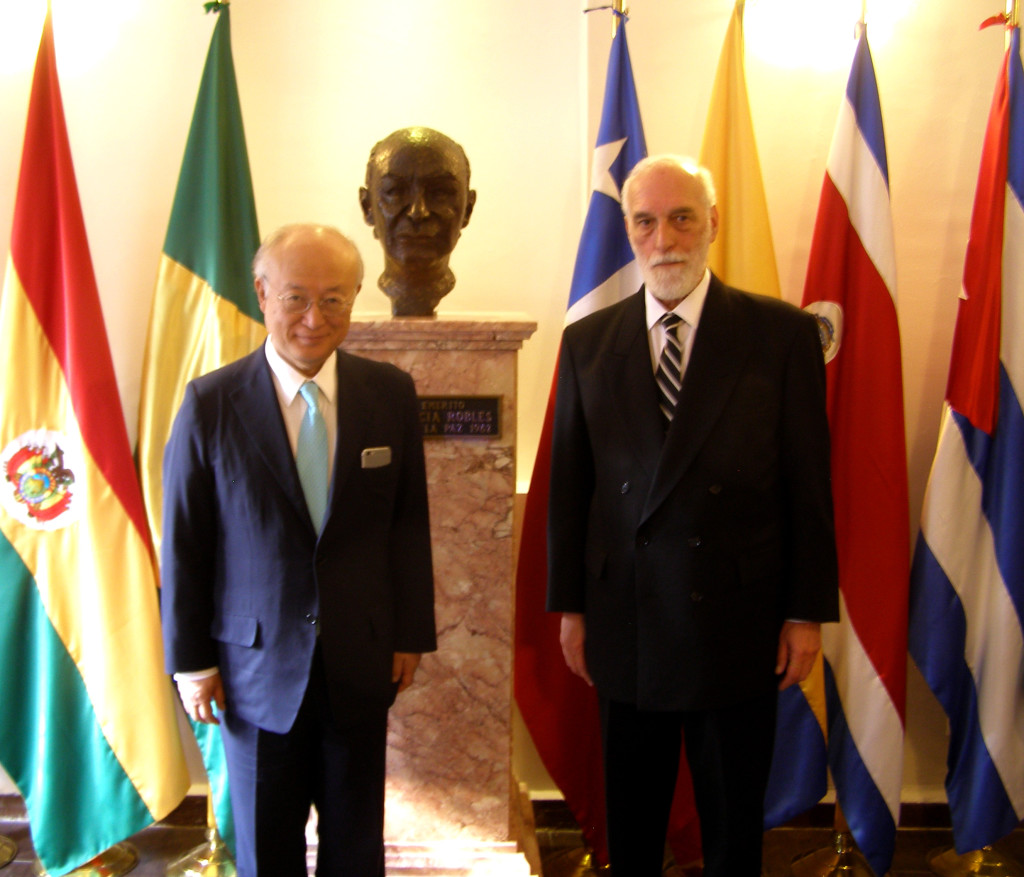
Mr. Yukiya Amano, Director General of the IAEA (left) and Amb. Luiz Filipe de Macedo Soares, Secretary General of OPANAL (right)
On 5 February 2016, the OPANAL Council held a special session on the occasion of the visit of Mr. Yukiya Amano, Director General of the International Atomic Energy Agency (IAEA), to the OPANAL’s headquarters.
The special session of the OPANAL Council, chaired by Ambassador Enio Cordeiro, Permanent Representative of Brazil to OPANAL and Ambassador of Brazil to Mexico, was attended by Representatives of the following OPANAL Member States: Argentina, Brazil, Colombia, Cuba, Guatemala, Haiti, Jamaica, Mexico, Paraguay, Peru and Venezuela.
The Chair of the OPANAL Council stated that “the Treaty of Tlatelolco establishes a Control System for monitoring and verification of the commitments assumed by the Member States of the Treaty of Tlatelolco, and this Control System relies heavily on the cooperation between OPANAL and the IAEA”.
For its part, the Secretary General of OPANAL, Ambassador Luiz Filipe de Macedo Soares, in his remarks, stated that “the Treaty of Tlatelolco accomplished a very rare deed in International Law by means of the creation of a new institute that came to be known as “nuclear-weapon-free zone”. Chiefly aimed at the security of Latin America and the Caribbean, the Treaty starts by assuring the right to develop nuclear energy for peaceful purposes. Moreover, it states, in an abundantly clear and lengthy way, in the seventeen paragraphs in its Preamble, the paramount goals of non-proliferation and complete prohibition of nuclear weapons”.
Mr. Amano said that all the Member States of OPANAL have concluded their comprehensive nuclear safeguards agreements with the IAEA and that they are implementing said agreements. He also noted that “the Treaty of Tlatelolco is a very good example to other countries”. In this regard, the IAEA Director General reminded the Forum on Experience of Possible Relevance to the Creation of a Nuclear-Weapon-Free Zone in the Middle East, organized by the IAEA in 2011, in which OPANAL participated. He said that “what we have learned is that despite the differences and the complexity of the nature, States in the [Middle East] region could have a very constructive discussion and were able to learn of your experience.”
The IAEA Director General also added that the peaceful use of nuclear technology is a very important issue for over 100 countries and that the IAEA identifies the technical cooperation and use of nuclear technology for peaceful purposes as a priority. Moreover, he noted that Sustainable Development Goals, adopted in September 2015, recognized the role of science and technology for development, and, in this sense "nuclear technology could be of help to attain the sustainable development goals."
On 10 October 1972, OPANAL and the IAEA concluded a Cooperation Agreement as foreseen in Article 19 of the Treaty of Tlatelolco. The IAEA safeguards agreements are essential to maintain the Latin America and the Caribbean region as a nuclear-weapon-free zone.